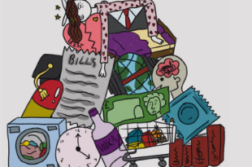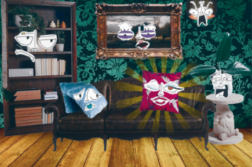The aim of this short piece on covert racism is to offer some insight into what it is like being a young, non-white person in Britain today; to encourage exploration into empathetic behaviours and understanding people that are outwardly different to us. It is a quest within a wider pursuit for change and social improvement in Britain and the world generally. I think this is a relevant and engaging piece given what is going on at present, and with people wondering how the George Floyd case in American relates to the UK and what we, as Britons, can do to help.
What Covert Racism is
We shed the heavy shackles some centuries ago, but our mental enslavement continues to be pursued with the same discriminatory conviction. This conviction is racially motivated. It need not always have an overt and gasping presence. Rather, racism too takes place through the accumulation of invisible whips evident in media portrayals, individual remarks, and societal behaviour (or lack thereof). Acts of covert racism are typically subtle and purposely wrapped in fanciful facade. Whilst not limited to this list, relevant examples of this covert racism include depicting non-white people as violent, dirty, or smelly, stereotyping tastes based on race and denying non-white people opportunities due to existing prejudices.
Covert Racism is all Around us
Non-white people are subjected to this kind of racism each day. As it is more subtle, this racism is largely inescapable as it is ingrained into our society: it spreads through social media; it multiplies in classrooms and playgrounds; it is the illicit bindings of the British cultural makeup and is identifiable in the social environment we Britons engage with and exist in. For non-white people, being aware of this hatred and disdain, even if subtle, unspoken or subconscious, can instil a mindset of non-acceptance.We find ourselves without acceptance because we acknowledge our nuanced tones of darker skin continue to be subject to nuanced aggression and slurs which are followed by the familiar collection of minor consequences, if there are any.
Reluctant Apologies Equate with Fake Woke Culture
Occasionally there will be apologies, but too often these are already spat-out regurgitations. Too often, these apologies occur to protect an image for self-interested purposes. These apologies do not seem to carry much sentiment or care for non-white people. Know that we feel and recognise the reluctance in your apologies. We know that, after causing harm, an apology may be socially demanded and failure to comply might amount to degrees of cancel culture. But how about just not causing harm in the first place? Or, at least, working to hold this intention?
Earlier, ‘subconscious’ was mentioned, as it is true that people do say things mistakenly or without much thought. This may not then justify the act of hammering down on offenders in itself, as their behaviour may not have been greatly conscious and intentional. However, with levels of criticism, we can at least observe and discuss issues and form deterrents for future offensive behaviour. At least then, over time, apologies might come from true sentiment and said apologies would be required far less frequently.
Desensitised by Covert Racism
We are, however, not yet at this stage. A dialogue concerning intentional racism needs enacting alongside the curbing of a supposedly more innocent, unintentional racism. This is what is meant by the faces of racism. You can be racist in different ways. You may not beat minority ethnic people up for fun, but disliking products and art and lives merely because they celebrate or remind you of certain ethnic cultures is also a discriminatory mindset.
Covert racial discrimination continues to be willingly executed and unapologetically exercised. One reason is that, due to its nature, it is harder to identify and properly prosecute than, say, physically abusing ethnic people or vandalising their homes and businesses. A second reason, occurring amongst non-celebs and ordinary circles, is that covert racism will often go without comment and recognition in a conscious manner due to its nuanced existence. i.e. the same groups of individuals saying or doing similar things each time. It’s old news and recycled hate speech, if you will. Plus, we are socialised to accept this kind of racism – the constitution of the specific discrimination occurring is perpetuated in popular media by stereotypes to such an extent that said stereotype is believable and its repetition is somehow acceptable.
Consequently, not only are victims desensitised in that encountering such abuse is normalised, but the offender desensitises a reservation for racism, and spew their remarks with increasing ease.
Change?
Expectedly, there is capacity in us to change and to evolve in the way that a species generally makes improvements. The means of doing so are complex as they consider the very core and essence of man – something which is, to date, a puzzling phenomenon. The putting together of this puzzle of harmonious racial relations is not so much the intention of this piece. It is rather to encourage people, my friends, my peers, our families to be more empathetic and engage in conversations which focus on understanding others and building a just Britain for both white and non-white people.
In light of the current surge in movements for justice, we should all feel urged to make use of the shared resources which are intended to educate and aid in our search for a better reality. The wanting and decadence seen in society is a telling of the many injustices felt by individuals of different identities. This is why this educational journey is interconnected with other typical forms of discrimination too, such as gender, sexual, and class. This article is short but, in being a quick read, may act as a precursor to something more substantial during this educational journey



